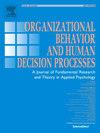From low power to action: Reappraising powerlessness as an opportunity restores agency
IF 3.8
2区 管理学
Q2 MANAGEMENT
Organizational Behavior and Human Decision Processes
Pub Date : 2025-03-01
DOI:10.1016/j.obhdp.2025.104404
引用次数: 0
Abstract
Agentic behaviors are a critical pathway to power in contemporary organizations. Paradoxically, employees who lack power are the least likely to think and act agentically—creating a self-perpetuating cycle of disadvantage. Existing research on facilitating employee agentic behaviors relies on structural solutions that are often out of reach for individual employees. Yet, anecdotal evidence suggests that this view may be incomplete, as some individuals seem to be able to overcome the challenges powerlessness poses without relying on external resources, control, or organizational change. Integrating research on powerlessness and cognitive reappraisal, the present research proposes that cognitively reappraising powerless situations as opportunities can help individuals cope with the negative effects low power has on agency. A negotiation simulation (Study 1) and two experience-sampling field experiments (Studies 2–3) support our predictions: cognitive reappraisal attenuates the negative effects of low-power experiences on approach-related orientation (i.e., the Behavioral Approach System), which subsequently facilitates several indicators of agentic behavior, including employees’ propensity to negotiate (Study 1) and their tendency to engage in voice and task proactivity at work (Studies 2–3). This research proposes a way to break the power-inaction link, suggesting that individuals may regulate their reactions to powerless experiences and offering an empowering and accessible strategy for sustaining agency.
从低权力到行动:重新评估无能为力作为一个机会恢复能动性
在当代组织中,代理行为是获得权力的重要途径。矛盾的是,缺乏权力的员工最不可能以主观的方式思考和行动,从而形成一个自我延续的劣势循环。现有的关于促进员工代理行为的研究依赖于结构性解决方案,而这些解决方案对于员工个体来说往往遥不可及。然而,轶事证据表明,这种观点可能是不完整的,因为有些人似乎能够克服无力感带来的挑战,而不依赖外部资源、控制或组织变革。结合对无力感和认知重评价的研究,本研究提出将无力感情境作为机会进行认知重评价可以帮助个体应对低权力对代理的负面影响。一项谈判模拟(研究1)和两项经验抽样现场实验(研究2-3)支持了我们的预测:认知重评减弱了低权力经验对方法相关取向(即行为方法系统)的负面影响,这随后促进了代理行为的几个指标,包括员工的谈判倾向(研究1)和他们在工作中参与声音和任务主动性的倾向(研究2-3)。本研究提出了一种打破权力-不作为联系的方法,表明个体可以调节他们对无能为力经历的反应,并为维持代理提供了一种授权和可访问的策略。
本文章由计算机程序翻译,如有差异,请以英文原文为准。
求助全文
约1分钟内获得全文
求助全文
来源期刊
CiteScore
8.90
自引率
4.30%
发文量
68
期刊介绍:
Organizational Behavior and Human Decision Processes publishes fundamental research in organizational behavior, organizational psychology, and human cognition, judgment, and decision-making. The journal features articles that present original empirical research, theory development, meta-analysis, and methodological advancements relevant to the substantive domains served by the journal. Topics covered by the journal include perception, cognition, judgment, attitudes, emotion, well-being, motivation, choice, and performance. We are interested in articles that investigate these topics as they pertain to individuals, dyads, groups, and other social collectives. For each topic, we place a premium on articles that make fundamental and substantial contributions to understanding psychological processes relevant to human attitudes, cognitions, and behavior in organizations. In order to be considered for publication in OBHDP a manuscript has to include the following: 1.Demonstrate an interesting behavioral/psychological phenomenon 2.Make a significant theoretical and empirical contribution to the existing literature 3.Identify and test the underlying psychological mechanism for the newly discovered behavioral/psychological phenomenon 4.Have practical implications in organizational context

 求助内容:
求助内容: 应助结果提醒方式:
应助结果提醒方式:


